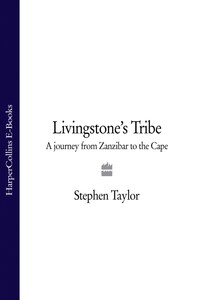William Collins
An Imprint of HarperCollinsPublishers 1 London Bridge Street London SE1 9GF
www.harpercollins.co.uk
This edition 2000
First published in Great Britain by HarperCollinsPublishers 1999
Copyright © Stephen Taylor 1999
The Author asserts the moral right to be identified as the author of this work
Maps copyright © Duncan Stewart 1999
All rights reserved under International and Pan-American Copyright Conventions. By payment of the required fees, you have been granted the nonexclusive, nontransferable right to access and read the text of this e-book on-screen. No part of this text may be reproduced, transmitted, downloaded, decompiled, reverse engineered, or stored in or introduced into any information storage and retrieval system, in any form or by any means, whether electronic or mechanical, now known or hereinafter invented, without the express written permission of HarperCollins e-books.
Source ISBN: 9780006550693
Ebook Edition © FEBRUARY 2016 ISBN 9780007394661
Version: 2016-01-12
HarperCollinsPublishers has made every reasonable effort to ensure that any picture content and written content in this ebook has been included or removed in accordance with the contractual and technological constraints in operation at the time of publication.
THIS IS AN ACCOUNT of a journey in search of a dying tribe. Even at the time I was travelling, in 1997, it was clear that whites as an ethnic minority were doomed in most parts of Africa. It seemed as though the colonial era had belonged to another century rather than to the previous generation. In Tanzania, Uganda, Malawi and Zambia the whites had all but disappeared; in Kenya they clung on diffidently. In Southern Africa, however, there remained hope. Although politically redundant, their economic influence appeared to assure them a future.
My interest in the whites who stayed on in what used to be rather quaintly known as ‘Black Africa’ dates back to the imperial retreat. From the bastion of South Africa, I grew up in the 1960s observing what became a familiar process. As each new African state acquired its independence, the old colonial hands would decamp. Some returned to Britain, but most flinched from the prospect of rationed sunlight and costly alcohol. Ultimately, much of this human debris was borne by the winds of change to South Africa.
The fact that the withdrawal coincided with the seemingly unstoppable rise of apartheid helped shape my own response to these events. When self-styled refugees from African rule came among us, bursting with the same racism as the dour, resentful xenophobes in charge of our own society, it seemed only natural to identify with those they had left behind. Even when the promise of uhuru gave way to cupidity, corruption and worse, the whites who continued to identify with African aspirations to the extent of sharing their fate acquired a certain defiantly heroic status.
At the same time I confess my own attitude to the continent was ambivalent. When I felt compelled to leave South Africa, in the 1970s, it was not to the black states to the north that I looked to make my home but to the motherland of my British antecedents. Only in 1980, and the coming of independence to Zimbabwe, did I feel the summons to test years of conviction by going to live in an independent African state. In the end I stayed for four years.
Since the first publication of this book, Zimbabwe has returned to the headlines. On page 203 I describe visiting a farmer friend, Alan. His efforts had brought him prosperity and his workers conditions that were the envy of all who knew them. I was intoxicated at the time by a heady fusion of landscape and memory, wondering whether I might not yet return to Africa again. Alan – sceptical and pragmatic – was, however, more alive to the precarious status of whites. His words were to be prophetic. The tide of venomous racism whipped up by Robert Mugabe in the election campaign of June 2000 led to almost a thousand white farms being invaded by squatter gangs. Alan and his family were among hundreds forced to flee their homes. His workers paid a severe price for their loyalty; a third had their homes razed.
The land seizures in Zimbabwe had an eerie echo of events in post-independence Tanzania and Uganda. There too white farmers and planters were dispossessed in the name of agricultural and political reforms that proved to be disastrous. In Uganda, at least, lessons were learnt. In the midst of the turmoil in Zimbabwe, an official Kampala daily newspaper said that Uganda needed commercial growers and proposed that land be offered for white Zimbabweans to settle.








